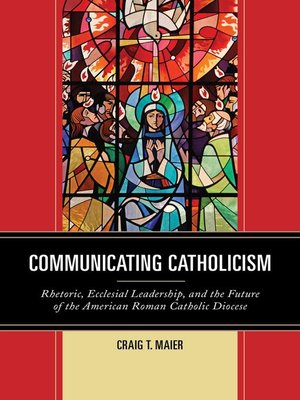Communicating Catholicism
ebook ∣ Rhetoric, Ecclesial Leadership, and the Future of the American Roman Catholic Diocese · The Fairleigh Dickinson University Press Series in Communication Studies
By Craig T. Maier

Sign up to save your library
With an OverDrive account, you can save your favorite libraries for at-a-glance information about availability. Find out more about OverDrive accounts.
Find this title in Libby, the library reading app by OverDrive.



Search for a digital library with this title
Title found at these libraries:
| Loading... |
Fr. Thomas Reese has observed that American Catholic dioceses are simultaneously mysterious and essential to the institutional health and vitality of American Catholicism. In recent years, as American Catholicism increasingly finds itself embroiled in scandal and conflict, this mysteriousness has given way to feelings of suspicion, frustration, and even contempt. How can American dioceses navigate this complex and often hostile social, cultural, and political environment?
Several decades ago, J. Michael Sproule invited rhetorical and communication scholars to focus on institutions to increase our understanding of the profound role complex organizations play in contemporary life, assess the purpose and significance of communication in pursuit of their missions, and "give a human face to the otherwise institutional voice of corporate suasion." Following Sproule, this book defines a new field called diocesan institutional rhetoric that strives to transform dioceses from structures characterized by closure and adversity into sites of hope-full, response-able, Spirit-led opportunity.
Today, rhetorical and communication issues emerge everywhere in American Catholicism. Drawing together relevant literature in Catholic theology, philosophy of communication, and corporate communication scholarship—as well as over twelve years' experience working as a communication professional in a diocesan chancery—this book helps diocesan leaders, scholars, and observers to think differently and more fruitfully about the future of American Catholic ecclesial leadership.
Several decades ago, J. Michael Sproule invited rhetorical and communication scholars to focus on institutions to increase our understanding of the profound role complex organizations play in contemporary life, assess the purpose and significance of communication in pursuit of their missions, and "give a human face to the otherwise institutional voice of corporate suasion." Following Sproule, this book defines a new field called diocesan institutional rhetoric that strives to transform dioceses from structures characterized by closure and adversity into sites of hope-full, response-able, Spirit-led opportunity.
Today, rhetorical and communication issues emerge everywhere in American Catholicism. Drawing together relevant literature in Catholic theology, philosophy of communication, and corporate communication scholarship—as well as over twelve years' experience working as a communication professional in a diocesan chancery—this book helps diocesan leaders, scholars, and observers to think differently and more fruitfully about the future of American Catholic ecclesial leadership.







